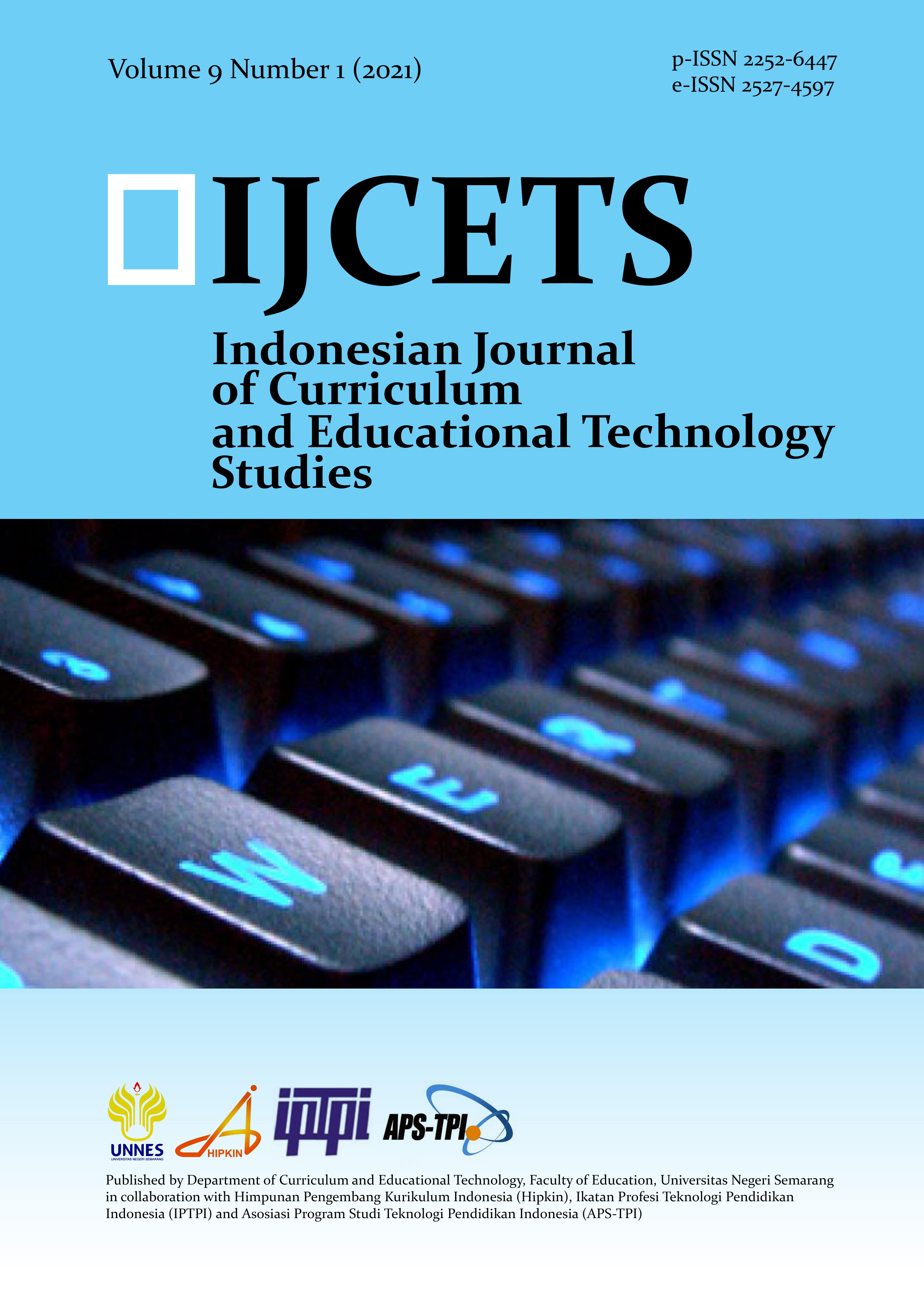Abstract
This study aims to reveal the relationship between teachers' digital literacy skills and the quality of online learning in schools. This research uses a quantitative approach with the type of correlation research. The researchers used a teacher digital literacy scale and online learning quality scale instruments to gather the data from 64 teachers as the sample of this research. The reliability of variable X is 0.750 and variable Y is 0.837. Next, the analysis of the data uses simple regression and product moment. The result of the research showed that (1) teachers’ digital literacy level at SMK N 2 Adiwerna is good in the category at 80,56% with an average score of 97.08, (2) in line with the previous finding, the quality of online learning also has a good result at 77.85% with an average score of 101.98, and (3) there is a relation between the level of teachers’ digital literacy and the quality of online learning, in detail the level of teachers’ digital literacy has a positive effect on the quality of online learning at SMK Negeri 2 Adiwerna.
Abstrak
Penelitian ini bertujuan mengungkapkan hubungan antara kemampuan literasi digital guru dengan kualitas pembelajaran daring di Sekolah. Metode penelitian menggunakan pendekatan kuantitatif dengan tipe penelitian korelasi. Sampel dalam penelitian ini adalah seluruh guru pengajar sejumlah 64 guru. Pengumpulan data melalui instrumen skala literasi digital guru dan skala kualitas pembelajaran daring. Dengan reliabel variabel X sebesar 0,750 dan variabel Y sebesar 0.837. Analisis data dilakukan dengan regresi sederhana dan product moment. Hasil penelitian menunjukkan: 1) Tingkat literasi digital guru di SMK Negeri 2 Adiwerna termasuk dalam kategori baik dengan perolehan scor 80,56% dari 100% dengan skor rerata 97,08, 2) Kualitas pembelajaran daring di SMK Negeri 2 Adiwerna termasuk dalam kategori baik dengan perolehan skor 77,85% dengan skor rerata 101,98, 3) Terdapat hubungan antara tingkat literasi digital guru dan kualitas pembelajaran daring di SMK Negeri 2 Adiwerna, bahwa tingkat literasi digital berpengaruh positif terhadap kualitas pembelajaran daring di SMK negeri 2 Adiwerna.
References
Ardi, Z., Syahril, S., & Anwar, M. (2019). Evaluation of Digital Simulation Learning Based E-Learning in SMK Negeri 2 Padang. International Journal of Educational Dynamics, 2(1), 188–198.
Benson, V., & Kolsaker, A. (2015). Instructor Approaches to Blended Learning: A Tale of Two Business Schools. International Journal of Management Education, 13(3), 316–325. https://doi.org/10.1016/j.ijme.2015.10.001
Borthwick, AC, & Hansen, R. (2017). Digital Literacy in Teacher Education: Are Teacher Educators Competent? Journal of Digital Learning in Teacher Education, 33(2), 46–48. https://doi.org/10.1080/21532974.2017.1291249
Gilster, P., & Watson, T. (1997). An Excerpt from Digital Literacy. Digital Literacy, 20.
Hamid, R., Sentryo, I., & Hasan, S. (2020). Online learning and its problems in the Covid-19 emergency period. Jurnal Prima Edukasia, 8(1), 86–95. https://doi.org/10.21831/jpe.v8i1.32165
Hee, OC, Ping, LL, Rizal, AM, Kowang, TO, & Fei, GC (2019). Exploring lifelong learning outcomes among adult learners via goal orientation and information literacy self-efficacy. International Journal of Evaluation and Research in Education, 8(4), 616–623. https://doi.org/10.11591/ijere.v8i4.20304
Jabor, MK, Sale, MI, Deba, AA, Musta'mal, AH, & Sadiq, A. (2013). Responsibility of school's leaders in tackling the E-learning barriers in technical and vocational education higher institutions. Journal on Efficiency and Responsibility in Education and Science, 6(3), 134–142. https://doi.org/10.7160/eriesj.2013.060301
Jannah, N., Mudjiran, M., & Nirwana, H. (2015). Hubungan Kecanduan Game dengan Motivasi Belajar Siswa dan Implikasinya Terhadap Bimbingan dan Konseling. Konselor, 4(4), 200. https://doi.org/10.24036/02015446473-0-00
Kemdikbud: Hanya 40 Persen Guru Siap dengan Teknologi. (December 4, 2018). Republica.co.id. https://www.republika.co.id/berita/pj60ej335/kemendikbud-hanya-40-persen-guru-siap-dengan-teknologi
Khuluqo, I. El, Ghani, ARA, & Fatayan, A. (2021). Postgraduate students' perspective on supporting “learning from home” to solve the COVID-19 pandemic. International Journal of Evaluation and Research in Education (IJERE), 10(2), 615. https://doi.org/10.11591/ijere.v10i2.21240
Landa, ZR, Sunaryo, T., & Tampubolon, H. (2021). Pengaruh Literasi Digital Guru dan Manajemen Pembelajaran Terhadap Minat Belajar Peserta Didik di SMA Pelita Rantepao. Jurnal Cendekia: Journal of Mathematics Education, 5(1), 718–734. https://doi.org/10.31004/cendekia.v5i1.529
Martin, A. (2006). A European framework for digital literacy. Nordic Journal of Digital Literacy, 2(1), 151–161. Retrieved from http://www.idunn.no/file/pdf/33191479/a_european_framework_for_digital_literacy.pdf
Nasir, M. (2013). Profesionalisme Guru Agama Islam: Sebuah Upaya Peningkatan Mutu melalui LPTK. Dinamika Ilmu, 13(2), 189–203. https://doi.org/10.21093/di.v13i2.25
Novi Kurnia, SIA (2017). Peta Gerakan Literasi Digital di Indonesia: Studi tentang Pelaku, Ragam Kegiatan, Kelompok Sasaran, dan Mitra yang Dilakukan oleh JAPELIDI. Informasi: Kajian Ilmu Komunikasi, 47(2), 149-166.
Nurhayati, E. (2020). Meningkatkan Keaktifan Siswa Dalam Pembelajaran Daring Melalui Media Game Edukasi Quiziz pada Masa Pencegahan Penyebaran Covid-19. Journal Paedagogy, 7(3), 145. https://doi.org/10.33394/jp.v7i3.2645
Martini, N., Yudana, M., & Natajaya, M. (2014). Kontribusi kompetensi pedagogik, kompetensi profesional, dan pengelolaan diri terhadap kemampuan guru mengelola pembelajaran tematik pada guru SD di Kecamatan Bangli. Jurnal Administrasi Pendidikan Indonesia, 5(1), https://ejournal-pasca.undiksha.ac.id/index.php/jurnal_ap/article/view/1311
Ministry of Education and Culture. (2020). Ministry of Education and Culture Letter No. 4 of 2020 on the Implementation of Educational Policies in the Emergency Period for the Spread of Coronavirus Disease (COVID 19).
Ramkissoon, P., Belle, LJ, & Bhurosy, T. (2020). Perceptions and experiences of students on the use of interactive online learning technologies in Mauritius. International Journal of Evaluation and Research in Education, 9(4), 833–839. https://doi.org/10.11591/ijere.v9i4.20692
Sari, N. (2020). Problematika Pelaksanaan Pembelajaran Daring masa Pandemic Covid-19 di MIN 3 Medan. Journal of Education And Teaching Learning (JETL), 2(3), 44–57. https://doi.org/10.51178/jetl.v2i3.67
Setyosari, P. (2017). Menciptakan Pembelajaran yang Efektif dan Berkualitas. JINOTEP: Jurnal Inovasi dan Teknologi Pembelajaran, Kajian dan Riset dalam Teknologi Pembelajaran, 1(5), 20–30. https://doi.org/10.17977/um031v1i12014p020
Shopova, T. (2014). Digital literacy of students and its improvement at the university. Journal on Efficiency and Responsibility in Education and Science, 7(2), 26–32. https://doi.org/10.7160/eriesj.2014.070201
Syarifudin, USA (2020). Impelementasi Pembelajaran Daring Untuk Meningkatkan Mutu Pendidikan Sebagai Dampak Diterapkannya Social Distancing. Jurnal Pendidikan Bahasa dan Sastra Indonesia Metalingua, 5(1), 31–34. https://doi.org/10.21107/metalingua.v5i1.7072
Tuluk, G., & Kepceoğlu, . (2019). Pre-service teachers' web pedagogical content knowledge and online information searching strategies. International Journal of Evaluation and Research in Education, 8(2), 229–236. https://doi.org/10.11591/ijere.v8i2.18771
Yilmaz, O. (2015). The effects of “live virtual classroom” on students' achievement and students' opinions about “live virtual classroom” at distance education. Turkish Online Journal of Educational Technology, 14(1), 108–115.
